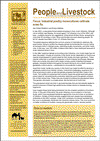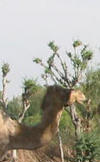People and Livestock Newsletter

Issue 4 of the People and Livestock newsletter focuses on avian influenza.
Read online or download. 76 kb, 6 pages
Cashing in on camels

Lokhit Pashu-Palak Sansthan (LPPS), LPP’s partner organization in India, has launched a project to promote camels as a source of income in Rajasthan’s deserts.
The project will:
- Educate and raise awareness of traditional camel breeding communities about new marketing options
- Support camel breeders in innovating their production systems
- Establish linkages with research institutes
- Liaise with and lobby government agencies for an appropriate policy framework
- Catalyze private sector involvement and investment in manufacturing and marketing camel products
- Strengthen camel breeders’ organisation to retain ownership of production processes
- Facilitate establishment of a common platform for all stakeholders in the camels.
LPPS has opened an office in Jaisalmer to manage this project. Contact:
Hanwant Singh Rathore
Reviving Rajasthan’s Camel Husbandry Project
LPPS, Plot #760, Anchalwansi Colony, Jaisalmer, Rajasthan, India
Tel. 02992-250652, mobile 09414818564
camelherds@yahoo.co.in, www.lpps.org
Reviving Rajasthan’s Camel Husbandry is a project of Lokhit Pashu-Palak Sansthan, conducted in cooperation with LPP in the context of the LIFE Network and supported by the Ford Foundation.
More information: 213 kb, 131 kb
Support Indian pastoralists’ traditional forest grazing rights

India marks its independence on 15 August – an ideal occasion to press for the rights of pastoralists to their traditional grazing rights in the country’s forests.
A ban on traditional grazing in forests threatens the pastoralists’ livelihoods. Many are forced to give up keeping animals, in turn threatening the survival of many unique livestock breeds.
India’s forests must be conserved. But so too must the livelihoods and rights of the people who depend on them.
Please print out one of these letters, sign it, and mail or fax it to the addresses below.
Letter to be signed by pastoral communities or associations. 27 kb
Letter to be signed by non-pastoral communities, volunteers or NGOs in support of pastoralists. 28 kb
Addresses
- Dr. Manmohan Singh, Prime Minister of India, New Delhi 110011. Fax 011 – 23019545, 23016857
- Mr. Raja, Minister of Environmental and Forests, Paryavaran Bhawan, Lodhi Road, New Delhi 3 (Fax 011 – 24362222)3)
- Dr. Abdul Kalam, President of India, Rashtrapathy Bhawan, New Delhi – 110 004 (Fax 011 – 23017290, 23017824)
- If you live in India, the authorities in your State.
- Go to the previous page
- 1
- …
- 68
- 69
- 70
- 71
- 72
- 73
- 74
- …
- 82
- Go to the next page
